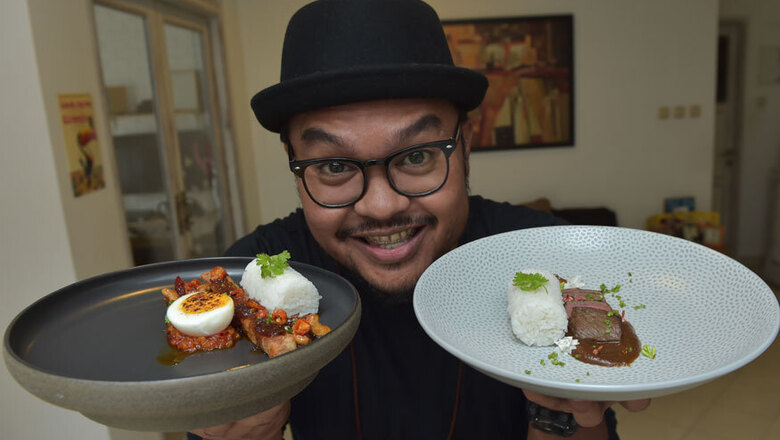
views
From a restaurant serving burgers and pizzas made with local noodles to a social media star giving street food a touch of haute cuisine, a new wave of innovative chefs are putting a modern twist on Indonesia's traditional fare.
New eateries have sprung up rapidly in recent years in the capital Jakarta offering a wide array of foreign foods to cater to a growing consumer class which has emerged after a long economic boom.
But rather than focus entirely on cuisine from overseas, some chefs decided to fuse the new influences with age-old Indonesian foods.
One eatery offering fusion food is "Mammamie", whose name is a playful take on an Italian expression of shock combined with the local word for noodles, "mie".
It uses the country's favourite instant noodles, Indomie -- cheap blocks of fodder in colourful packaging that are sold at almost every grocery store and supermarket -- to make Western dishes.
Among the most popular are the "mizza", a pizza whose base is made out of noodles, and a "merger", a burger which has buns fashioned from Indomie. It also serves burrito, quesadillas and sushi dishes made with the noodles.
Cafe owner Muhammad Luqman Baehaqi said he was trying to appeal to young Indonesians who were keen to try Western foods but still enjoyed Indomie.
"There isn't a single Indonesian person that doesn't know Indomie," the 39-year-old said. "It's tasty and familiar to all of us."
The small cafe can seat about 20 people on chairs designed to look like Indomie packing cases and has a distinctly hipster vibe, with young office workers enjoying dishes that cost the equivalent of about two to four dollars under an image of late Apple founder Steve Jobs.
Gourmet street food
While the "Mammamie" cafe uses Indonesian ingredients to spice up Western dishes, Jakarta chef Dede Akbar is taking local dishes as his starting point, and seeking to make them more classy.
In his brightly-decorated kitchen, the 34-year-old carefully placed two blocks of tempe -- a traditional soybean patty -- onto a plate. He blowtorched a hard-boiled egg, and added small flowers as a garnish before artistically dripping sauce across the dish.
Satisfied with his creation, he took out a camera and snapped pictures from various angles, before uploading them to Instagram. It was his popular Instagram account "Warteg Gourmet", which currently has about 40,000 followers, that catapulted him to fame.
Wartegs are modest stalls or kiosks selling cheap food, often cramped spaces on street corners where blue-colour workers stop for a bite and to smoke a cigarette.
But rather than drab dishes for people earning low incomes, Akbar said he celebrates warteg food as it has "different textures and a wide range of colours that we can play with".
Akbar was inspired to make haute-cuisine, warteg-style food after becoming annoyed at the careless presentation of dishes at the traditional streetside eateries.
What started off as a hobby became an obsession, and eventually Akbar found he was receiving so many invites to be a "food stylist" at events that he quit his day job as an advertising agency art director to become a full-time chef.
He hopes his efforts can help raise the profile of humble Indonesian street food, which is not as well-known as local cuisine from other parts of Asia, such as Thailand.
"I want to make Indonesian food more appreciated by Indonesians in general and recognised internationally," he said.



















Comments
0 comment